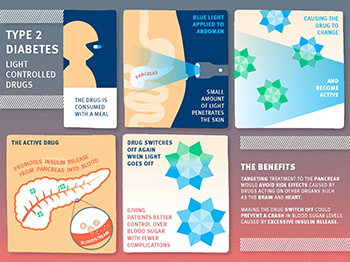
How JB253—a light-controlled type 2 diabetes drug—works. Credit: Imperial College London, U.K.
A light-activated drug, engineered by researchers at the Imperial College London, U.K., and LMU Munich, Germany, could allow better control over blood sugar levels in people with type 2 diabetes (Nat. Commun., doi: 10.1038/ncomms6116. A modified version of sulfonylurea, a popular diabetes drug, is activated when exposed to a blue LEDs stuck to the skin. When the light is turned off, the drug is deactivated, allowing for very specific control over insulin release and blood sugar levels.
The modified sulfonylurea drug, called JB253, contains an azobenzene photoswitch that changes the shape, and therefore the function, of the molecule. JB253 can be “photoconverted” between its cis- (active) and trans- (inactive) states by exposure to different wavelengths of light. When the researchers exposed the JB253 molecule to wavelengths between 400 and 500 nm (blue-violet light), they observed a shape change to the active form. When left in the dark, JB253 reverted to its inactive shape.
The researchers used rodent and human pancreatic cells to demonstrate that, when activated by blue light, JB253 stimulated insulin release. This was confirmed with in situ imaging and hormone assays. Although JB253 is not ready for human trials, the team says these recent laboratory demonstrations are encouraging.
David Hodson of Imperial College, London, noted that in principle, this type of therapy may allow better control over blood sugar levels “because it can be switched on for a short time when required after a meal,” and because it targets the drug’s activity “to where it’s needed in the pancreas.” Sulfonylureas are considered effective and affordable, but they do have “off-target” effects, like low blood sugar, increased risk for heart disease and weight gain. By allowing tailored control of insulin release, the azobenzene photoswitch in JB253 could reduce these undesirable outcomes, according to the researchers.
Type 2 diabetes affects nearly 350 million (1 in 12) adults worldwide. Insufficient control of blood sugar in people with type 2 diabetes can lead to heart disease, stroke, as well as damage to the nervous system, kidneys and retinas.
